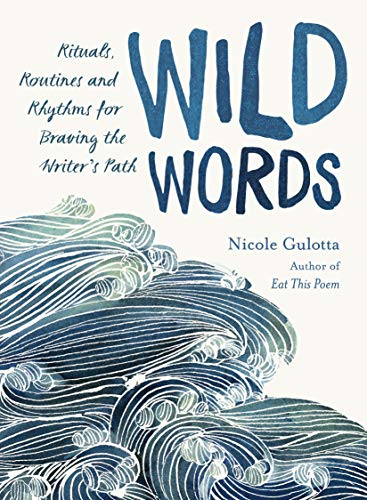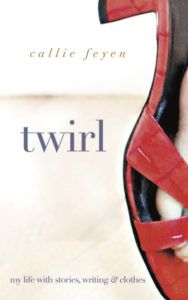I would like to begin by pretending.
We are in my classroom, and it has the vibe of a coffee shop, but you each have your own desk to work at. There are plenty of pens and pencils, markers, scissors, and tape, all in colorful cups in the back of the classroom. There’s a pencil sharpener too, but it’s the old-school kind because I know the most benign way to take a break is to sharpen a pencil and, really, I’m doing you a favor because it takes longer to crank the handle than it does to shove the pencil into the electric sharpener and hear that dreadful buzz it makes, disrupting all of us. So, you’re doing me a favor, too.
There’s plenty of paper of all kinds here. I don’t want computers, but I don’t know if my imagination is confident enough for that. I’m trying to pretend there are no computers in this classroom.
On the chalkboard are Nicole Gullota’s words: “I’m considering my life as a poem.”
Class, today, this is how we will begin. I want you to consider your life as a poem. What would that look like? How would that feel? Go through your day, think of all your activities, chores, and to-dos, and consider poetry in each of them.
I would give you time to write, sketch, or create a collage if you wish. There would be music, and you’d each have your own mug of coffee, tea, or hot chocolate while you work.
We would share our writing after a while. I would start, because I have found that the best way to cultivate vulnerability in a classroom is to be vulnerable myself, and so I would tell you the story of why I left teaching. I would tell you that on my last day, I was taking down a poem by Marjorie Maddox I’d taped to my classroom door when a teacher walked by and asked me why I was leaving.
I told her there was no poetry in what I do anymore. It felt like the perfect thing to say. I felt the truth of the words before I understood them.
I would tell you that this was almost four years ago, and I think I’ve been trying to hunt for poetry in what I do ever since, but it was Nicole’s declaration that turned my wandering into more of a vocational quest, and poetry is the compass.
And if my life is a poem, then that means I am the stuff of poetry, which means I have everything I need for the journey.
I would want to hear from you too, and so we would discuss our lives as poems for a bit, and then, because we’re here to discuss “The Season of Going Back in Time” and “The Season of Discontent” in Wild Words, we’d try out a few more rituals. It reminds me I love that Nicole calls them rituals instead of exercises. It’s so much more, well, poetic.
Feel free to fill up your mug. I’ll wait. I might pour myself some more coffee as well.
I think what I’d do next is start with a confession: I really don’t like to talk about writing. I’d prefer to write. And I don’t want to write about wanting to write.
Put it this way: must you know that you’re a writer in order to write? Wouldn’t you rather write and find out?
I think talking or writing about wanting to write but being unsure if you can is the same thing as saying you’d really like to run but you don’t know if you’re a runner.
Put on your shoes and go outside.
We would study a few of Virginia Woolf’s journal entries in A Writer’s Diary, because Nicole brings that wonderful resource up in her book. I would encourage you to keep a writing diary as well, but take note that Ms. Woolf is writing about the writing she’s done, or the writing she hopes to do and that this is a tool for her to wonder and wander so that she can get back to the story.
I think I would have us make writer’s notebooks from here on out. I would set some time each class to write an entry. Perhaps the prompts would be:
1) What I wrote about:
2) How the writing went:
3) What I struggled with:
4) One thing I loved:
5) One place I found hope:
6) One thing I was surprised by:
Then, we’d move right to Nicole’s call to “See what’s there in the midst of our days, odd as they might become.” Maybe I’d tell you that while I was writing this, my 13-year-old daughter came to my room to talk to me about science. Instead of being annoyed that she interrupted me, I chose to put my pen down, and face Hadley, and listen. I noticed how large her eyes got and that she uses her hands to tell a story. I chuckled at the fact that it was 11 am in the morning and we were still in our PJs, doing work and school, but this is the story of our days now.
Maybe I’d tell you that while Hadley and I were talking, Harper was downstairs practicing the theme song to Star Wars, on the piano, and listening to her beginning attempts I’d think, “See? She doesn’t consider whether or not she can play; she plays.”
I’d have you do the same thing: think of your days, and find stories. You are not allowed to say nothing ever happens. If you you do, I will give you a tablespoon of Playdoh and I will tell you to learn how much you can make with something so small. You will amaze yourself, and you’ll look at the moments of your days differently; like poetry.
I would hope that by now you are beginning to see all the stories around you—that you’ve begun to see your life (and yourself, perhaps) as a poem.
We would need to wrap up, because it’s probably time for lunch, or history, but I would want to tell you that now the real work begins. Now is the time to take a look at the story you long to tell, sit down, and take a walk on the page.
Stop pretending. And I’ll see you next week.
Discussion
1. What would it look like if you considered your life as poetry? Write a journal entry, draw, or create a collage that explores this idea.
2. Consider setting up a writer’s diary with the prompts given in this post. Write in it after you have written for the day, and see what happens.
3. If you like, create a timeline of your creative history, as Nicole suggests in Chapter 3. What conclusions, or resolutions do you come to after completing this exercise?
4. Nicole walks us through a three-step journey in Chapter 4: “Make peace, make priorities, make progress.” How can you implement this in your daily life?
____
Editor’s note: Join us this month as Callie Feyen leads a book club discussion of Nicole Gulotta’s Wild Words: Rituals, Routines and Rhythms for Braving the Writer’s Path. We’re reading on the following schedule:
Photo by plaits, Creative Commons, via Flickr. Post by Callie Feyen.
A Writer’s Dream Book
This book gives language to the fierce concerns of an ordinary woman. It tracks small but defining moments, attesting to the joys of design and the pleasure of color we feel as we choose and joke and work and play in jeans, sandals, a coat, T-shirts. Start reading and you will be hooked.
—Jeanne Murray Walker, author of The Geography of Memory
- Poetry Prompt: Courage to Follow - July 24, 2023
- Poetry Prompt: Being a Pilgrim and a Martha Stewart Homemaker - July 10, 2023
- Poetry Prompt: Monarch Butterfly’s Wildflower - June 19, 2023



Michelle Ortega says
Here is my life right now, as poetry. I have cherished every minute of down time these past few months, despite the circumstances that surround them.
Unexpected.
A halt in the freight train-world of sleep, work, sleep. Now, slow mornings, body awakens on its own each morning at 7:45, coffee sips, words in my journal, thoughts drift themselves conscious, block letter doodles in candy-colored ink, like the neon reflections of Radio City Music Hall on the wet sidewalk. I recall our January weekend in New York City: messy snow, Muji (buying the pens on a whim), Beetlejuice on Broadway. A whole freedom ago––but this morning, fecund hush. My daughter sleeps behind her closed door, the washer churns against the dryer’s steady hum, two cats sleep across the room, purring. A chipmunk barking in the woods, birds chirp and twit on branches, a mower blazes under my window, fresh cut grass, evaporating dew.